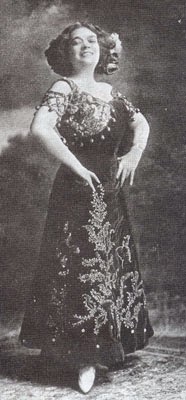Rosalia Chalia
Rosalia Chalia , bourgeois Rosalia Herrera del Castillo , (born November 17, 1864 in Havana ; † November 16, 1948 ibid) was a Cuban opera singer ( mezzo-soprano / soprano ) whose vocal performances were recorded using the speaking machines that were new at the time , Phonograph , graphophone and gramophone , could be reproduced.
Life
Chalia, daughter of a Spanish Grand Admiral, began singing when she was a child, for example at the age of twelve during a reception given by US President Ulysses S. Grant . In the following years Chalia began studying singing with Giovanni Sbriglio in Paris and with Gellio Benvenuto Coronaro in Milan . Ultimately, however, Chalia temporarily ended her work as a singer due to a marriage.
In 1894 Chalia began to advance her musical career again by joining the Gustav Hinrichs Opera Company founded by Gustav Hinrichs in 1888 and named after him. 1898 she transferred to the Metropolitan Opera in New York City and debuted there as Santuzza in the opera Cavalleria rusticana by Pietro Mascagni . After just one more engagement in the title role of Verdi's Aida , she left the Metropolitan Opera again and joined the Damrosch Opera Company founded by Walter Damrosch in 1894, later renamed the Damrosch-Ellis Opera Company, and performed on various stages with this ensemble the United States . Along with this engagement, she also appeared at the Opera of Mexico over a period of fourteen years .
Between 1900 and 1908 Chalia sang in the opera company she founded and traveled with them to the countries of the South American continent, including Cuba , Mexico and Venezuela , the country in which she gave her last performance in 1916, in order to live in New York and from then on Dedicated to promoting young talented singers on their way to the United States. In 1947 Chalia returned to Cuba, where she died a year later in Havana.
Recordings (selection)
Chalia was one of those singers who began early to record their performances and publish them on sound carriers. As early as 1896 she could be heard on Gianni Bettini's phonograph cylinders . Then in 1900 on Zonophone and from 1901 on Victor shellac records .
- 1901: The last Rose of Sum (Victor)
- 1901: Home, sweet home (Victor)
- 1901: Serenata Argonessa (Victor)
- 1901: La ci darem (Victor)
- 1901: Se tu m'ami mio ben (Victor)
- 1901: I live and love thee (Victor)
literature
- Karl-Josef Kutsch , Leo Riemens : Large singer lexicon . Volume 4, 4th edition, KG Saur Verlag, Munich 2003, ISBN 3-598-11598-9 , p. 798.
Web links
- Rosalia Chalia at Operissimo on the basis of the Great Singer Lexicon
- Rosalia Chalia audio files in the National Jukebox of the Library of Congress (English). Retrieved June 15, 2019.
- Rosalia Chalia in the database of DAHR (English). Retrieved June 15, 2019.
Individual evidence
- ^ Library of Congress: Audio Recordings. Retrieved June 3, 2018 .
| personal data | |
|---|---|
| SURNAME | Chalia, Rosalia |
| ALTERNATIVE NAMES | Herrera del Castillo, Rosalia (real name) |
| BRIEF DESCRIPTION | Cuban opera singer (mezzo-soprano / soprano) |
| DATE OF BIRTH | November 17, 1864 |
| PLACE OF BIRTH | Havana |
| DATE OF DEATH | November 16, 1948 |
| Place of death | Havana |
